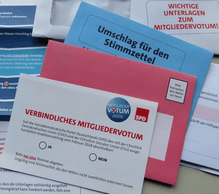SPD party member vote on the 2018 coalition agreement of Germany

The SPD party member vote on the 2018 coalition agreement of Germany took place from 20 February to 2 March 2018.[1] The members of the SPD party decided per postal vote whether the coalition treaty with CDU and CSU parties will be accepted or not. The result, 66.02% in favor of the Yes campaign, was published on 4 March 2018. It was decisive for Angela Merkel's plan to get re-elected as chancellor of Germany on 14 March in the German Bundestag.[1]
Background
After the German Federal elections in 2017 in which the SPD gained only 20.5%, the worst result ever, then SPD chief Martin Schulz had ruled out a participation of his party in a new federal government with the CDU party of Angela Merkel. Even after the failed coalition talks between CDU, FDP, and Alliance 90/The Greens, the party board stuck to the no decision. But in December 2017 opinions changed, the board voted in favor of exploratory talks. After they were successfully completed, the SPD party entered coalition talks with CDU and CSU parties in January 2018. Martin Schulz had to step back after the coalition talks.[2]
Procedure
All SPD members received their election documents until 20 February 2018. All members who were registered as party member up to 6 February 2018 6 p.m., in total 463,723 were eligible to vote.[1] The question was: "Soll die Sozialdemokratische Partei Deutschlands (SPD) den mit der Christlich Demokratischen Union (CDU) und der Christlich-Sozialen Union (CSU) ausgehandelten Koalitionsvertrag vom Februar 2018 abschließen?" ("Should the Social Democratic Party of Germany enter into the coalition treaty agreed with the Christian Democratic Union (CDU) and the Christian Social Union of Germany (CSU) in February 2018?")[3]
Reactions
Several SPD politicians asked the party members to vote Yes, such as Andrea Nahles and Thomas Oppermann. Kevin Kühnert, chairman of the Jusos party youth organisation and the #NoGroKo (No Grand Coalition) initiative promoted the No campaign.[1] Some SPD politicians such as SPD vice chairman Thorsten Schäfer-Gümbel feared extensive consequences for the party, should the majority vote No. The Minister President of Lower Saxony, Stephan Weil, warned of a "phase of political instability" in the case of a No victory. Also the German foreign minister Sigmar Gabriel urged his party "not to retreat into the study rooms". New Federal elections were seen by many as a possible result of a No vote, while others spoke in favor of a CDU minority government.[4]
Result
The result was 66.02 % in favor of the coalition agreement.[5]
| Eligible voters | Cast votes | Valid votes | Yes | No |
|---|---|---|---|---|
| 463,723 | 378,437 (Turnout: 78.4 %) | 362.933 | 239,604 (66.02 %) | 123,329 (33.98 %) |
References
- 1 2 3 4 Die SPD hat entschieden, FAZ.net
- ↑ Der steile Aufstieg und tiefe Fall von Schulz, Bazonline.ch
- ↑ Und wenn sie Nein sagen?, Zeit.de
- ↑ SPD-Spitze sieht Deutschland bei Nein zur GroKo vor Neuwahlen, Tagesspiegel.de
- ↑ Mehrheit der Mitglieder stimmt für große Koalition, Zeit.de